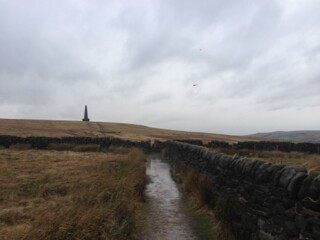Ted Hughes in Hebden Bridge
Tom Overton
In ‘Stubbing Wharfe’, a poem from Birthday Letters, Ted Hughes writes about sitting with Sylvia Plath in a pub ‘Between the canal and the river’ in Hebden Bridge, West Yorkshire:
This gloomy memorial of a valley,
The fallen-in grave of its history,
A gorge of ruined mills and abandoned chapels,
The fouled nest of the Industrial Revolution
That had flown.
Hughes was born in Mytholmroyd, his birth registered in Hebden. Plath is buried on the other side of the Calder Valley, at Heptonstall.
Bernard Ingham once described Hebden as ‘the lesbian Capital of Great Britain’; in 2001 he lamented the influx of ‘trendies, yuppies and weirdos’. In 2014, the BBC’s Evan Davis made a wilfully eccentric argument for rebranding it as the UK’s second city (population: 4200), because of the number of ‘professional couples’ who’ve settled there so they can commute to the ‘Northern Powerhouse’. Jez Lewis’s 2010 film Shed Your Tears and Walk Away documented the rates of suicide and drug addiction among those left behind by the gentrification. Meanwhile, the ability of the wuthering heights above the town to handle the run-off of rainwater is being compromised by a millionaire landowner burning moorland for grouse-shooting.
The flow of water down the valley powered the first textile mills, which powered Hebden Bridge’s original growth. Up on the moors on Boxing Day last year, the level of rainfall gave normally modest streams a resonant fullness. In ‘Four March Watercolours’, from River, Hughes calls it ‘baroque superabundance’; ‘the pour/Of melted chocolate.’
Turning into something more like the apocalyptic flood at the beginning of Tales from Ovid, it poured into the boutiques and cafes on Hebden’s Market Street, and washed a small bus along with it. The independent bookshop lost its entire stock. The canal and river burst their banks and met in the pub between them, the Stubbing Wharf.
River was first published with photographs by Peter Keen in an edition sponsored by British Gas, who wanted PR for their installation of North Sea gas pipes across the countryside. There is an ‘unspoken pathos’ here, Jonathan Bate’s recent biography of Hughes argues:
Principally as a result of conversion from town gas to natural gas, deaths in Britain by gas (either accidental or suicidal) fell from over 1000 in the year that Sylvia was one of them to under 300 in 1970, when the supply to Clapham was converted, a year too late for Assia.
River also features in Max Porter’s Grief is the Thing with Feathers. The sons describe their Hughes-scholar father going as an adolescent to see his hero talk:
It was time to shed all that crap and assess the poetry without partisan biographical bickering... he had imagined some vigorous arguments in a wood-panelled pub with a gaggle of Plath fans. ‘OK, OK, we’ll accept River,’ they’d say. ‘Fair enough,’ Dad would say, ‘I’ll have another go at Colossus.’
Porter told me River was simply his favourite of Hughes’s books, the one he’d direct someone to who wanted to find the poetry and not the poet.
The description of salmon as ‘Trapped face-workers, in their holes of position/under the mountain of water’ in ‘Four March Watercolours’ makes me think of the closure of Kellingley Colliery, the last deep coal mine in Britain, a week before the floods. The Telegraph called it ‘shutting the book on a trade that stoked the industrial revolution and helped fuel an empire’. But the book isn’t really shut; last year the global average concentration of carbon dioxide in the atmosphere surpassed 400 parts per million. In ‘After Moonless Midnight’ the speaker steps into the river to fish, and finds himself held
With its blind, invisible hands.
‘We’ve got him,’ it whispered, ‘We’ve got him.’
